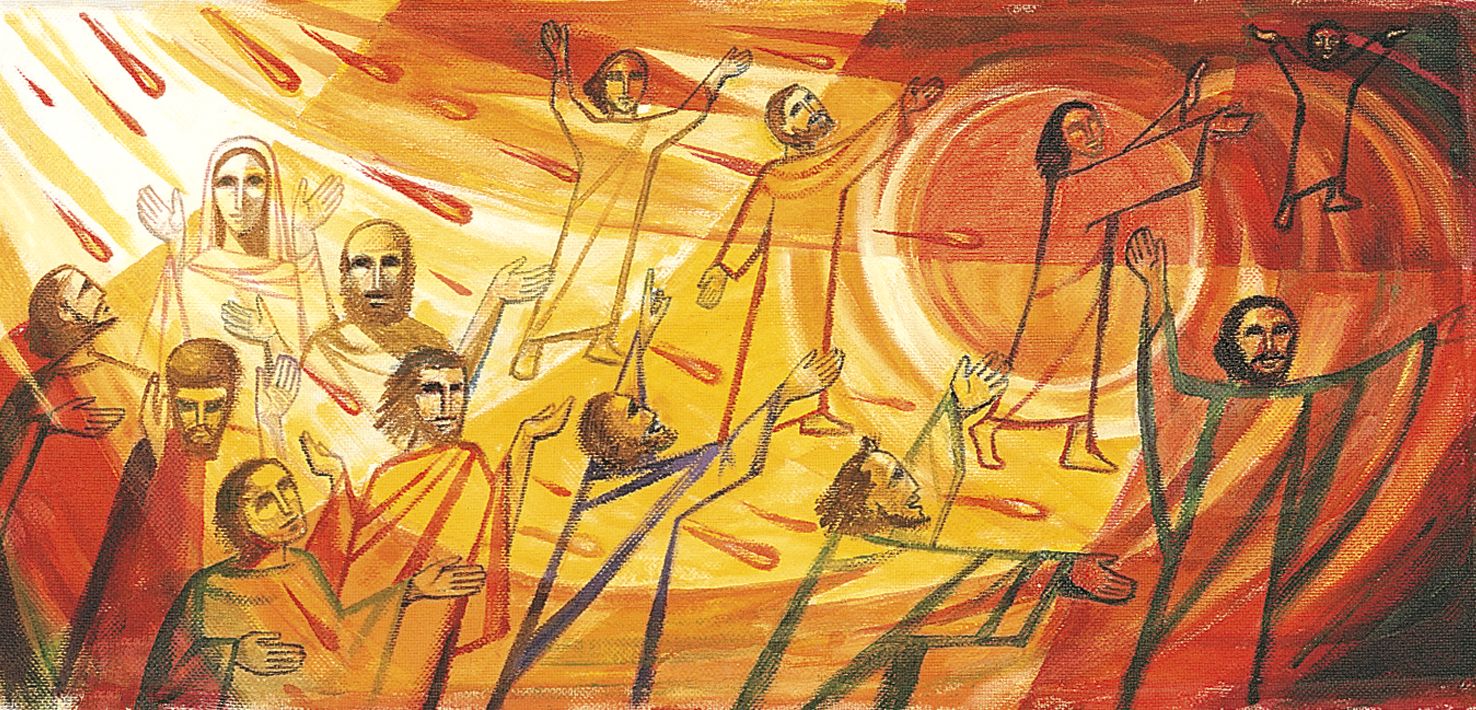The story has all the appeal of a science fiction thriller. There are strange sights and sounds. An alien force breaks through locked doors, possesses a group of men and gives them supernatural powers. No this story isn’t the brainchild of L. Ron Hubbard or Isaac Asimov. The story is found in the Book of Acts, which was written almost two thousand years ago. It is the story of the first Pentecost and the gift of the Holy Spirit. Churches around the world celebrated this event last Sunday. (You can read the story in Acts 2:1-21.)
I’m amazed at how quickly people can miss the central message of this story, because they argue over insignificant details. Did the disciples really look like BIC lighters with little flames of fire on their heads? Was the disciples’ ability to speak in other languages anything like the gifts of tongues that Pentecostals or Charismatics often receive when they are “baptized in the Spirit”? Were there REALLY three thousand converts after Peter’s somewhat convoluted sermon?
Let’s go with the idea that the writer of Acts wanted to communicate something more to his audience than merely a historical occurrence. (Let’s not get into the discussion as to whether or not the events recorded in Acts are historical or symbolic.) One of the characteristics that I appreciate in the Emerging Church/Progressive Christianity is the emphasis on seeking to discover what the author wanted to say to his intended audience.![]()
God is Present
The disciples had been hiding in that upper room behind locked doors for several weeks. Sure, they had been waiting, but they had also been questioning. They’d seen Jesus leave them and ascend into heaven. After walking with Jesus for three years, I’m sure they wondered if Jesus would be with them (and how) when they ventured into the world.
The Book of Acts was probably written in 70-80ce to Christians who had never seen Jesus. Instead, they had responded to the preaching of the disciples and now were facing persecution and other hardships because of their faith. They were questioning whether or not Jesus was with them and if he was keeping his promise to never forsake them.
We’re in the same predicament today as the early Christians were. We haven’t seen Jesus—though some people claim to have seen him in a piece of toast, or a reflection off of a building. We too wonder if Jesus is with us.
The writer to the Book of Acts yells, “God is here, on earth.” Fire has always been a symbol for God. Do you remember the burning bush and also the pillar of fire? Those flames of fire on the disciples was the writer of Acts telling his readers, in no uncertain terms, that God is present in the gift of the Holy Spirit. God is not a distant God who views the goings on of earth from some a place called heaven. No, not at all! God is involved in the lives of God’s children, and not just as a little fire, but as a mighty wind.
God is Powerful
Presence is one thing, but how about God being present and able to do something? Again the writer of Acts waves a flag at his readers and announces that God is not only present, but that God is powerfully present in the person of the Holy Spirit.
When we think of wind, we envision a breezy day, or perhaps even a tornado or hurricane. The word for “wind” can also be translated, “breath.” God blowing on the disciples on the day of Pentecost is reminiscent of God blowing into the lifeless lump of clay called Adam on the day of creation. God breathes on the disciples and they come alive—powerfully alive.
The Holy Spirit isn’t a destructive wind, though we might occasionally want such a demonstration of God’s power. The Holy Spirit is a constant, steady wind, like a prairie wind. On the prairie, the steady wind turns the windmills that pump the water. In our lives, the Holy Spirit moves and:
• Softens our hard hearts and loosens our stiff necks,
• Produces gradually the fruit of the Spirit—love, joy, peace …,
• Builds a community of believers that loves each other and works together (at least that that’s how it’s supposed to work),
• Gives us hope, strength, comfort along with the ability to love and forgive.
Sure, there’s flash and dazzle in the Spirit’s work, but more often it is constant, steady and life-changing.
Everyone’s Included
I think the speaking in other languages carries an important message with it, but probably not in the way you think. I don’t think the writer of Acts gave much thought to the idea of being baptized in the Spirit and speaking in strange languages. He wasn’t much for ecstatic and flashy—just read through his works of Luke and Acts—it’s pretty common stuff. I do think the writer wanted to tell his readers, though, that the kingdom of God that Jesus brought to the world was for everyone—no one was excluded.
There’s no secret handshake or password to being a Christian. The Holy Spirit moved through the disciples in such a way that everyone who had gathered in Jerusalem for the festival was able to hear the good news in his or her language. What a powerful message this is for those of us who are tempted to think in terms of “us” and “them.”
The passage of scripture that we use to remind us of that first Pentecost carries a powerful message. It is a message that we can carry with us as we journey down the path toward a sane faith, and discover what it means to be faithful, obedient disciples of Jesus Christ in today’s world.


I saw the link to your blog and started reading… very interesting – your thoughts on the mission trip were thought provoking. It’s a topic I’ve been pondering for some time, too. But my reason for sending a note this morning is your blog about Hell (which I’m sure you’ve had some feedback about . I chuckled when you mentioned your Roman Catholic relatives who you were told were going to Hell (our priest said the same thing to us about Lutherans!). I’ve been part of several different types of churches over the years and am so thankful for the rise in Echumenism. But I have a question about your assertion that we don’t need to keep “Hell” in our belief system. It’s mentioned so many times in the Bible, even Jesus mentions it by name a number of times and refers to it as a place. Can you help me understand better?
Good to hear from you Linda. With your permission, I’d like to copy your comment and my response to the comment section of my blog sot hat others can read it if they are interested.
In the blog, I didn’t intend to take on the existence of hell (that may come later) rather only our need for it as we live our daily lives. Do we need it for motivation?. Do we respond best to fear rather than promise? I don’t think that we need the fear of hell to determine our moral or ethics. I believe that God’s love and our relationship with God is enough motivation. I don’t think we need to have the fear that our friends will be going to hell as motivation for sharing with them the gospel of Jesus Christ. I think our desire to have them experience the life with God that we experience is enough motivation.
Okay on the subject of hell. It isn’t mentioned in the OT until Daniel. Before that Jews believed in Sheol, the place of the dead. The Jews probably pick up the idea of hell from the Persians and Zoroastrianism under Cyrus. Jesus talks very little about heaven and hell. He seems to be more interested in life on early than the afterlife. When he does talk about hell, he uses the word Gehenna. Gehenna was Jerusalem’s garbage dump. It was constantly on fire, smell, and wasn’t a nice place to be around. Could it be that Jesus’ mention of hell was more allegorical rather than empirical? For example in Matthew 25 both the sheep and the goats are followers. They aren’t Christian/non-Christian. Could it be that Jesus’ idea of judgment was not a condemnation, but rather an encouragement to see the important things in life–living for others.